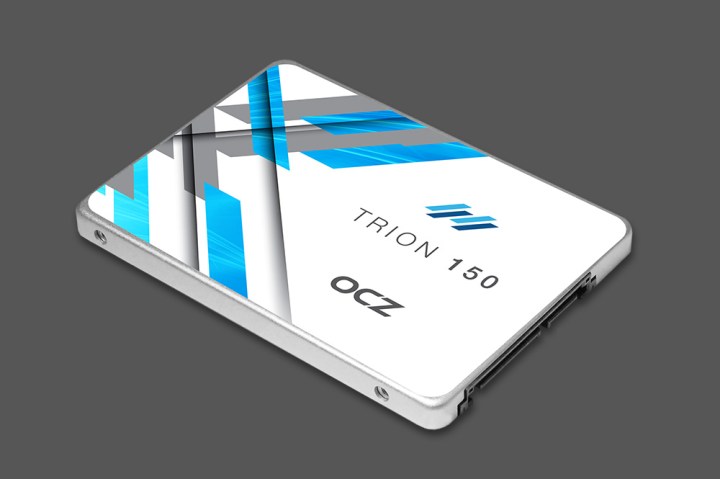
The Trion 150, starting at $50 for 120 gigabytes of storage and offering up to 960GB for $270, is the follow-up to OCZ’s Trion 100 line of SSDs. According to the spec page, the drive offers up to 550 megabytes per second read speeds and write speeds of 530MB/s, and up to 90K random write performance and 64K random read performance.
These aren’t high-end numbers, but at a price point this low that’s not surprising. The website for the drive mentions repeatedly that the NAND flash cells are from Toshiba, which is in not unusual. Toshiba is one of the world’s largest producers of flash memory.
The drive comes in four sizes: 120GB, 240GB, 480GB, and 960GB. The performance and reliability varies between models, as seen in the chart below.
| OCZ Trion 150 | 120GB | 240GB | 480GB | 960GB |
|---|---|---|---|---|
| Price | $50 | $70 | $140 | $270 |
| Max Read | 550 MB/s | 550 MB/s | 550 MB/s | 550 MB/s |
| Max Write | 450 MB/s | 520 MB/s | 530 MB/s | 530 MB/s |
| Max Random Read (4KB, QD32) | 79,000 IOPS | 90,000 IOPS | 90,000 IOPS | 90,000 IOPS |
| Max Random Write (4KB, QD32) | 25,000 IOPS | 43,000 IOPS | 54,000 IOPS | 64,000 IOPS |
| Steady-State Random Write (4KB, QD32) | 2,200 IOPS | 3,200 IOPS | 3,200 IOPS | 3,600 IOPS |
| TBW (Total Bytes Written) Endurance | 30 TB | 60 TB | 120 TB | 240 TB |
| Daily Usage Guidelines | 27 GB/day | 55 GB/day | 110 GB/day | 219 GB/day |
OCZ has a mixed reputation for reliability, particularly with their discount line. This is something OCZ is hoping to fight with a relatively generous three year warranty. Their web site states USA residents should, in the event of a faulty drive, be able to talk to a representative within 24 hours, and (pending troubleshooting) have a new drive shipped to them within 24 hours of that conversation.
Overall it’s a compelling price point for a decent amount of power, and should look pretty tempting to anyone still using a conventional hard drive in their rig.


